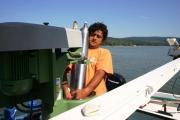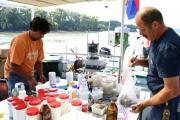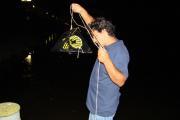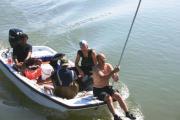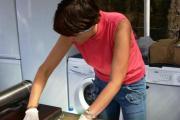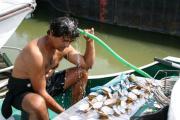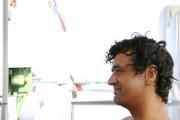
"He helps out with just about everything," says JDS2 Technical Coordinator Jaroslav Slobodnik. "Besides the biology-related sampling activities he does at each sampling station, you can also find Momir working on a side project for the European Commission, helping the chemists on-board, translating for the crew, fixing and maintaining machinery and countless other small and routine tasks from moving bottles to cleaning up."
His main job is to collect sediment, macrozoobenthos (i.e. small organisms living at the river bottom) and mussels at each sampling station. This requires going out with the small boats and diving into the water with a wetsuit, at times having to wade through the water for 30 to 60 minutes, at each site. "This is my favourite job," says Momir. "The best experience yet was a hot day near Paks, Hungary where we found many interesting and larger than usual mussels."
He's helping the European Commission with its research project, ALARM. This requires him to place smelly meat into basket traps each night, then placing the traps into the water and collecting them to study invasive macrozoobenthos Danube species that have fallen into the traps.
For the trio of on-board chemists, he provides valuable physical help in moving and opening up the heavy and cumbersome stainless steel cylinder used to collect samples of suspended solids (i.e. tiny particles suspended in the water). What happens here is that a submerged pipe outside the Argus continually sends thousands of litres of water to an on-board centrifuge. The centrifuge forces the particles onto a Teflon plate from which the particles are then "scratched off" by the chemists, similar to getting to the last smears of Nutella at the bottom of a jar. Getting one sample alone takes about four to six hours of flow. It also takes some serious effort to get into the centrifuge.
"I can't lift the cylinder myself,' says Romanian chemist Carmen Hamchevici. "It can only be handled by a strong and helpful man and Momir is that man. "He also helps with many other tasks such as maintaining the ship's pumps. Everything is positive about Momir."
"He gives spirit to the whole team and never hesitates to support anyone at anytime when needed," says Igor Liska, the ICPDR's Project Manager for JDS2.
Being Serbian, and given that the Argus is a Serbian ship, Momir sleeps on the Argus together with the rest of its Serbian crew. "I sleep on the Argus because I was sleeping on it for 10 days as we brought the ship from Serbia to Germany for the launch," says Momir.
"He's a bridge between the crew and the rest of the team, helping to make sure the expedition goes smooth," says Slobodnik. Momir adds that, in the beginning, he and Team Leader Bela Csanyi did a lot of translating between crew and the Serbian and Hungarian boat captains. "Now everyone is communicating with each other much better and on their own," says Momir.
"It would be hard for either the crew or the team to imagine what the survey would be like without Momir. This multi-purpose man is indispensable to us all."
"I do it because I accepted this obligation and I want to finish everything connected to this work," says Momir. "The rest of the team and crew are my friends, and that is what we are supposed to do - help each other." Momir adds that the hardest thing about the JDS2 is being away from his two kids. "But I will see them in two days in my home town of Belgrade as the ships pass through."













